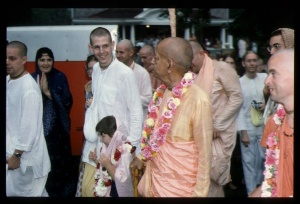SB 5.11.10: Difference between revisions
m (1 revision(s)) |
(Vanibot #0054 edit - transform synonyms into clickable links, which search similar occurrences) |
||
| (One intermediate revision by one other user not shown) | |||
| Line 1: | Line 1: | ||
{{info | {{info | ||
|speaker= | |speaker=Jaḍa Bharata | ||
|listener=King | |listener=King Rahūgaṇa | ||
}} | }} | ||
[[Category:Srimad-Bhagavatam - Canto 05 Chapter 11]] | |||
[[Category:Bhagavatam Verses Spoken by Jada Bharata - Vanisource|051110]] | |||
<div style="float:left">'''[[Srimad-Bhagavatam]] - [[SB 5|Fifth Canto]] - [[SB 5.11: Jada Bharata Instructs King Rahugana|Chapter 11: Jaḍa Bharata Instructs King Rahūgaṇa]]'''</div> | |||
<div style="float:right">[[File:Go-previous.png|link=SB 5.11.9]] '''[[SB 5.11.9]] - [[SB 5.11.11]]''' [[File:Go-next.png|link=SB 5.11.11]]</div> | |||
{{RandomImage}} | |||
==== TEXT 10 ==== | ==== TEXT 10 ==== | ||
<div class="verse"> | |||
<div | :gandhākṛti-sparśa-rasa-śravāṁsi | ||
gandhākṛti-sparśa-rasa-śravāṁsi | :visarga-raty-arty-abhijalpa-śilpāḥ | ||
visarga-raty-arty-abhijalpa-śilpāḥ | :ekādaśaṁ svīkaraṇaṁ mameti | ||
ekādaśaṁ svīkaraṇaṁ mameti | :śayyām ahaṁ dvādaśam eka āhuḥ | ||
śayyām ahaṁ dvādaśam eka āhuḥ | |||
</div> | </div> | ||
| Line 17: | Line 22: | ||
==== SYNONYMS ==== | ==== SYNONYMS ==== | ||
<div class="synonyms"> | |||
<div | ''[//vanipedia.org/wiki/Special:VaniSearch?s=gandha&tab=syno_o&ds=1 gandha]'' — smell; ''[//vanipedia.org/wiki/Special:VaniSearch?s=ākṛti&tab=syno_o&ds=1 ākṛti]'' — form; ''[//vanipedia.org/wiki/Special:VaniSearch?s=sparśa&tab=syno_o&ds=1 sparśa]'' — touch; ''[//vanipedia.org/wiki/Special:VaniSearch?s=rasa&tab=syno_o&ds=1 rasa]'' — taste; ''[//vanipedia.org/wiki/Special:VaniSearch?s=śravāṁsi&tab=syno_o&ds=1 śravāṁsi]'' — and sound; ''[//vanipedia.org/wiki/Special:VaniSearch?s=visarga&tab=syno_o&ds=1 visarga]'' — evacuating; ''[//vanipedia.org/wiki/Special:VaniSearch?s=rati&tab=syno_o&ds=1 rati]'' — sexual intercourse; ''[//vanipedia.org/wiki/Special:VaniSearch?s=arti&tab=syno_o&ds=1 arti]'' — movement; ''[//vanipedia.org/wiki/Special:VaniSearch?s=abhijalpa&tab=syno_o&ds=1 abhijalpa]'' — speaking; ''[//vanipedia.org/wiki/Special:VaniSearch?s=śilpāḥ&tab=syno_o&ds=1 śilpāḥ]'' — grasping or releasing; ''[//vanipedia.org/wiki/Special:VaniSearch?s=ekādaśam&tab=syno_o&ds=1 ekādaśam]'' — eleventh; ''[//vanipedia.org/wiki/Special:VaniSearch?s=svīkaraṇam&tab=syno_o&ds=1 svīkaraṇam]'' — accepting as; ''[//vanipedia.org/wiki/Special:VaniSearch?s=mama&tab=syno_o&ds=1 mama]'' — mine; ''[//vanipedia.org/wiki/Special:VaniSearch?s=iti&tab=syno_o&ds=1 iti]'' — thus; ''[//vanipedia.org/wiki/Special:VaniSearch?s=śayyām&tab=syno_o&ds=1 śayyām]'' — this body; ''[//vanipedia.org/wiki/Special:VaniSearch?s=aham&tab=syno_o&ds=1 aham]'' — I; ''[//vanipedia.org/wiki/Special:VaniSearch?s=dvādaśam&tab=syno_o&ds=1 dvādaśam]'' — twelfth; ''[//vanipedia.org/wiki/Special:VaniSearch?s=eke&tab=syno_o&ds=1 eke]'' — some; ''[//vanipedia.org/wiki/Special:VaniSearch?s=āhuḥ&tab=syno_o&ds=1 āhuḥ]'' — have said. | ||
</div> | </div> | ||
| Line 25: | Line 29: | ||
==== TRANSLATION ==== | ==== TRANSLATION ==== | ||
<div class="translation"> | |||
<div | |||
Sound, touch, form, taste and smell are the objects of the five knowledge-acquiring senses. Speech, touch, movement, evacuation and sexual intercourse are the objects of the working senses. Besides this, there is another conception by which one thinks, "This is my body, this is my society, this is my family, this is my nation," and so forth. This eleventh function, that of the mind, is called the false ego. According to some philosophers, this is the twelfth function, and its field of activity is the body. | Sound, touch, form, taste and smell are the objects of the five knowledge-acquiring senses. Speech, touch, movement, evacuation and sexual intercourse are the objects of the working senses. Besides this, there is another conception by which one thinks, "This is my body, this is my society, this is my family, this is my nation," and so forth. This eleventh function, that of the mind, is called the false ego. According to some philosophers, this is the twelfth function, and its field of activity is the body. | ||
</div> | </div> | ||
| Line 32: | Line 35: | ||
==== PURPORT ==== | ==== PURPORT ==== | ||
<div class="purport"> | |||
There are different objects for the eleven items. Through the nose we can smell, by the eyes we can see, by the ears we can hear, and in this way we gather knowledge. Similarly, there are the ''karmendriyas'', the working senses—the hands, legs, genitals, rectum, mouth and so forth. When the false ego expands, it makes one think. "This is my body, family, society, country," etc. | |||
</div> | |||
<div | <div style="float:right; clear:both;">[[File:Go-previous.png|link=SB 5.11.9]] '''[[SB 5.11.9]] - [[SB 5.11.11]]''' [[File:Go-next.png|link=SB 5.11.11]]</div> | ||
__NOTOC__ | |||
</div> | __NOEDITSECTION__ | ||
__NOTOC__ | |||
Latest revision as of 22:03, 18 February 2024

A.C. Bhaktivedanta Swami Prabhupada
TEXT 10
- gandhākṛti-sparśa-rasa-śravāṁsi
- visarga-raty-arty-abhijalpa-śilpāḥ
- ekādaśaṁ svīkaraṇaṁ mameti
- śayyām ahaṁ dvādaśam eka āhuḥ
SYNONYMS
gandha — smell; ākṛti — form; sparśa — touch; rasa — taste; śravāṁsi — and sound; visarga — evacuating; rati — sexual intercourse; arti — movement; abhijalpa — speaking; śilpāḥ — grasping or releasing; ekādaśam — eleventh; svīkaraṇam — accepting as; mama — mine; iti — thus; śayyām — this body; aham — I; dvādaśam — twelfth; eke — some; āhuḥ — have said.
TRANSLATION
Sound, touch, form, taste and smell are the objects of the five knowledge-acquiring senses. Speech, touch, movement, evacuation and sexual intercourse are the objects of the working senses. Besides this, there is another conception by which one thinks, "This is my body, this is my society, this is my family, this is my nation," and so forth. This eleventh function, that of the mind, is called the false ego. According to some philosophers, this is the twelfth function, and its field of activity is the body.
PURPORT
There are different objects for the eleven items. Through the nose we can smell, by the eyes we can see, by the ears we can hear, and in this way we gather knowledge. Similarly, there are the karmendriyas, the working senses—the hands, legs, genitals, rectum, mouth and so forth. When the false ego expands, it makes one think. "This is my body, family, society, country," etc.